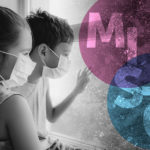A new symptom of COVID-19 in young children: Croup

During the Omicron surge, pediatricians and emergency departments (EDs) began noticing something new: a surge in croup among infants and young children. Marked by a distinctive “barking” cough and sometimes noisy, high-pitched intakes of breath, croup can happen when colds and other viral infections cause the voice box, windpipe, and bronchial tubes to become inflamed and swollen.
Doctors at Boston Children’s decided to take stock, looking back at their records of children with croup and COVID-19. In a report in the journal Pediatrics, they provide the first rigorous description of COVID-19-related croup, reviewing the cases of 75 children who came to the ED.
The review extended back to the beginning of the pandemic, but 80 percent of the children arrived during the Omicron surge. “There was a very clear spike when Omicron became the dominant variant,” says study leader Dr. Ryan Brewster, a resident in the Boston Combined Residency Program in Pediatrics.
A snapshot of COVID croup
Some of the croup cases at Boston Children’s were surprisingly severe, requiring more medication doses than usual and prompting more hospital admissions than expected. In keeping with the usual pattern of croup, most of the children were under age 2, and about 70 percent were boys. Except for one child with a common cold virus, none had a viral infection other than COVID-19.
Although no children died, nine of the children (12 percent) were struggling to breathe and needed to be hospitalized. Four of the nine (44 percent) required intensive care. By comparison, before COVID-19, fewer than 5 percent of children with croup were hospitalized, according to a medical review. Of those, only 1 to 3 percent needed to be intubated.
“Most cases of croup can be treated in the ED or pediatrician’s office with the steroid dexamethasone and supportive care,” Dr. Brewster says. “Our relatively high rate of hospitalization and the number of treatments hospitalized kids needed — an average of six doses of dexamethasone and eight treatments with nebulized epinephrine — suggests that COVID-19 might cause more severe croup than other viruses. We need more research to determine the best treatment options for these children.”
Why are all these cases of COVID-19 croup cropping up?
Evidence from several laboratory studies suggests that the Omicron variant mainly attacks the upper airway — the throat and bronchial tubes — whereas earlier strains mainly targeted the lungs, says Dr. Brewster. While these studies were in animals, it seems likely that the same is true for people.
What if my child has croup?
You can care for mild croup at home by sitting with your child while they breathe cool mist from a humidifier or steam from a hot shower for 15-20 minutes. A favorite song or book can help ease your child’s anxiety, which can worsen croup symptoms.
But the following signs should prompt a call to your pediatrician, and possibly a visit to the emergency department:
- frequent noisy inhalations and barking cough at rest (when your child is calm and not moving around)
- clear struggles to breathe: sucking in the breastbone or ribs, using the belly muscles to help take breaths, flaring the nostrils
- increased fatigue or sleepiness
- blue lips or blue finger tips
- a temperature higher than 100.4°F for more than three days
- symptoms of mild croup lasting longer than seven days
If my child has croup, does that mean they also have COVID-19?
It’s possible. “While many viruses can cause croup, you should also consider the possibility that your child has COVID-19,” says Dr. Jonathan Mansbach, who is chief of Hospital Medicine at Boston Children’s and oversaw the study. “Consider getting testing them and other family members tested, especially if there’s reason to think they’ve been exposed.”
Learn more about COVID-19 research at Boston Children’s
Related Posts :
-

COVID-19 vaccination in 12- to 18-year-olds: What does the science say?
With a third “booster” dose of the Pfizer/BioNTech vaccine now authorized for children age 12 and older, you may be ...
-

Pregnant mothers who get COVID-19 vaccines are also protecting their babies
Recent studies have shown that COVID-19 vaccination is safe for expectant mothers and can protect them against infection, severe illness, ...
-

More details on MIS-C, the post-COVID multi-system inflammatory syndrome in children
Boston Children’s Hospital and collaborators launched the national Overcoming COVID-19 study in April to track children, teens, and young ...
-

Joining the fight against COVID: Women scientists at Boston Children’s are leading the way
When the COVID-19 pandemic hit in 2020, many women scientists around Boston Children’s pivoted to studying the new coronavirus and ...





